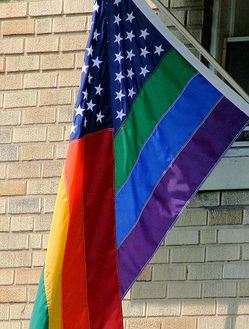The gayest of times, the worst of times

By Bob Moser, Texas Observer
Bobby Beltran was already having a blue Christmas. Because of his job, the 26-year-old was missing his tight-knit family's celebration back home in Brownsville for the first time. After work on Christmas night, to cheer himself up, Beltran joined some friends and co-workers at Rain, a gay bar in downtown Austin. He was accompanied by Chris Ortega, an Austin native who'd recently returned to Texas' supposed beacon of tolerance -- and had, only weeks before, come out to friends as gay.
Let Beltran pick up the story: "Leaving Rain about 1:30 or 2 in the morning, we walked westward to the corner of Lavaca and gave each other a goodbye hug. At that exact moment there was a car going the same way, westbound on Fourth Street. The driver yelled, 'Hey, you fucking faggots, quit that queer shit!'"
Plenty of people would have ducked their heads and pretended to ignore the slurs. But Beltran, who came out at age 13, says "that's just not the person I am." He's an activist. He'd joined protests after two gay softball players were followed last February from another Fourth Street bar and brutally assaulted by four men outside city hall. "What came instantly to my mind was what happened to the Shady Ladies, the two softball players," he says. "They never caught the guys. So that snapped into my head, and I immediately turned around and said, 'Hey, get that out of here. We do not welcome that in Austin. Get out of here!'"
It wasn't long before the five young men were out of the car, surrounding Beltran and Ortega, yelling more slurs while pummeling them. With 20 or so bystanders watching, the beating went on, unchecked, for several minutes before a friend came out of the bar and had the good sense to call 911 and holler, "The cops are coming!" The assailants split. An officer finally arrived and said there wasn't much he could do. He took their descriptions, gave Beltran and Ortega a case number and said he'd call if anything developed.
As much as anything, Beltran was mystified by the response -- not just of the police, but of the silent witnesses who didn't lift a finger, didn't call 911, didn't take down the license-plate number, didn't use their cell phones to photograph the perpetrators. But again, he did not keep quiet. He went home, photographed his battered face, and posted it on Facebook. A few local media outlets took notice and ran stories -- some outraged, some perfunctory. When I talked with Beltran a week after the hate crime, he broke down twice as we talked. But he remained unbowed. While some have criticized him for talking back to the homophobes, he said he'd do it again.
"I was talking on behalf of everybody: 'Listen, I don't accept you calling me that. That is not my name; that is not my label. I'm a person. I'm a human being. Treat me like one." And now, he says, "I'm not stopping. I don't know exactly how, but I'm going to fight for the people who it might happen to later, and for people who don't have a voice, who've already been attacked. Because it will happen again."
In a sense, Beltran and Ortega were caught -- physically, violently -- in the paradox of being gay in America at this contradictory moment. Queer folk like them, and me, have more of our rights than we've ever had before. But with visibility has come a backlash. A recent study of 14 years of FBI hate-crime data by the Southern Poverty Law Center found that gay men and lesbians are more than twice as likely to be victims of hate crimes than Jews, three times more than African Americans, four times more than Muslims.
It's a long slog yet to full equality -- not merely legal rights, but genuine cultural respect. A long slog till it's every bit as unacceptable to call Beltran a "fucking faggot" as it is to call a black man a "nigger," a Latino a "spic," a Muslim a "terrorist." A long slog to the time when political hate-mongers like Texas Congressman Louie Gohmert and Religious Right leaders like David Barton and John Hagee can no longer bash gays publicly without fear of repercussions.
But when we finally get there -- and we will -- we'll have people like Bobby Beltran to thank. People who would not silently let themselves be abused. People who got knocked down and came up fighting for their dignity. And everyone else's.
(Photo via WikiMedia Commons.)
